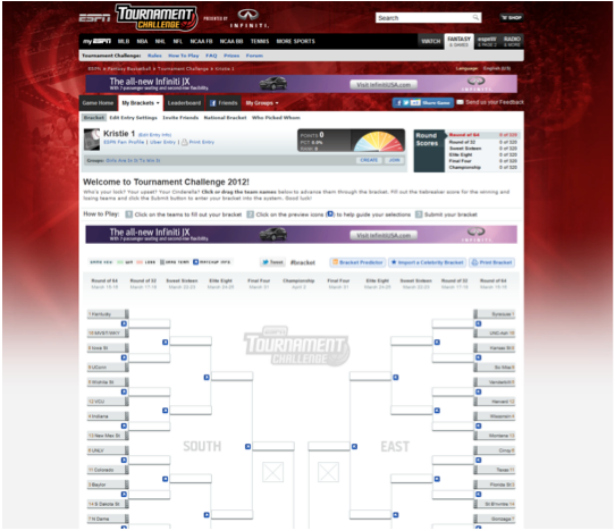ESPN’s Tournament Challenge sets bracket record with 6.45 million entries

Ever wonder how your bracket measures up against, not only your co-workers in the office pool, but everyone else in the country? Each year, the ESPN Fantasy section on ESPN.com logs millions of brackets to its free-to-play Tournament Challenge game, now in its 15th year. This year, ESPN logged a new record 6.45 million brackets, 8.9 percent more than 2011. Everyone can check how their brackets are doing against their friends within a specific group, but only ESPN has an inside peek at the top brackets from around the country.
How does the Fantasy team do it? The team can check group stats, user predictions, who picked whom and more through a simple – yet incredibly clever – query tool.
ESPN Front Row spoke to John Diver, Senior Director of Product Development, ESPN Fantasy, about the internal tool that measures the pulse of America’s bracket picks:
FR: How long has the Fantasy team been using this tool?
JD: We’ve used the tool since the first year Tournament Challenge launched in 1998. It initially only tracked two data points – entries created and brackets submitted – and was parsed by time (min/hour/day) to track activity. As the years progressed, the demand for more info increased. Our database gurus would write custom queries and communicate the results back to the different groups who requested the data. Our internal team eventually built out the tool that now enables anyone with access to use it to find the answers. Currently, about 30 people from different ESPN groups have access.
FR: What sort of outcomes can the tool analyze?
JD: My favorite part of this is viewing the Year-Over-Year data for “Entries Created by Minute,” and it’s cool to graphically monitor thousands of brackets submitted per minute (at some points up to 100 brackets per second!).
After the brackets are announced on Selection Sunday, the tool goes beyond the public-facing “National Bracket” and “Who Picked Whom” pages to search different combinations of predictions. For example, we can determine what percentage of overall brackets have all the No. 1 seeds for each round up to the Final Four.
(97.7%) predicted Kentucky and Syracuse and Michigan State and North Carolina to advance to the Round of 32;
(67.9%) predicted all four No. 1 seeds to advance to the Sweet Sixteen
(28.3%) predicted all four No. 1 seeds to advance to the Elite Eight
(4.3%) predicted all four No. 1 seeds to advance to the Final Four
It also can show team vs. team by round, like this possible classic matchup in the Elite Eight:
(38.8%) entries predicted Kentucky and Duke would meet in the Elite Eight
(30.3%) entries predicted Kentucky to defeat Duke in the Elite Eight
After the tournament starts, and the upsets begin, the tool enables us to go beyond the public facing leaderboard pages to answer such questions as “After the first 16 games, how many perfect brackets were there? If none, how many went 15-1, 14-2…” and so on. As we progress into the later rounds, it enables us to answer how many brackets had a perfect Final Four and so on.
Last year, just two of the 5.9 million-plus brackets in the Tournament Challenge correctly predicted the entire Final Four. We were also able to track how many brackets had three, two, one and no Final Four teams correct. The improbable VCU-Butler matchup busted the most brackets, as just 192 brackets correctly predicted VCU and Butler to meet in the Final Four. Overall, just 36,732 (0.6%) had Butler in the Final Four, and 5,791 (0.1%) had VCU in the Final Four. I still find it amazing that anyone had a perfect Final Four last year.
FR: In the past 14 seasons since the game launched, which Cinderella team caused the biggest bracket buster in the history of Tournament Challenge?
JD: Currently the tool does not archive the data to allow us to query for this info (feature request idea!). The biggest bracket buster in recent memory was Northern Iowa’s upset over No. 1 Kansas in the second round in 2010. I recall 42% of all brackets picked Kansas to win the tournament that year and the name Ali Farokhmanesh (Northern Iowa’s player who hit the game-winning shot) should always be synonymous with the term “bracket buster.”







